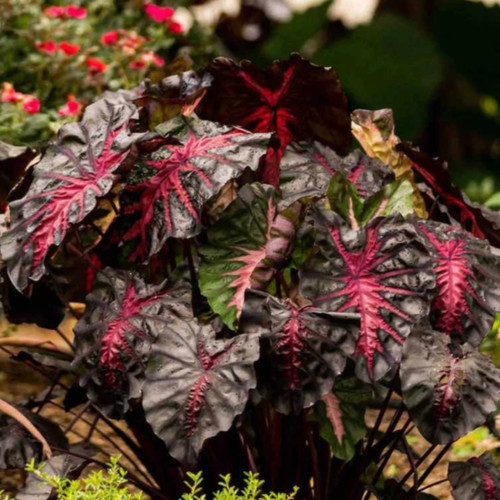Colocasia
Uses:
- Tropical Garden Focal Point
- Poolside & Deck Plantings
- Container Thriller
- Houseplant
Features:
- Tolerates Heat, Humidity & Wet Soil
- Strong Achitectural Form
- Giant Heart-Shaped Leaves
Sunlight:
- Partial to Full Sun
- At Least 5 Hours of Sunlight
Growing Zones:
- 8-11
- What is My Zone?
Colocasias feature giant tropical foliage, which will lend a touch of the exotic to any landscape. The arching leaves can reach up to 3 feet long. These plants grow well near pond edges and in containers. Containers plants can be overwintered indoors as houseplants. Colocasia esculenta is widely grown as a food crop known as taro in tropical regions.
About Colocasia

Elephant Ear, Taro
Asia, Africa, and the Pacific Islands
Annuals
Semi-Evergreen, Deciduous, Herbaceous
8–11
White, light green, yellow-green, greenish
Summer to Early Fall
Clumping, upright
Bees, Flies, Birds, Hummingbirds, Waterfowl, Butterflies, Aphids and Scale Insects
Heat and Sun, Drought, Moisture, Cold, Salt Tolerance
Deer, Aphids, Mealybugs, Scale insects, Spider mites
How To Use Colocasia In The Garden
Colocasia, commonly known as elephant ear, is renowned for its expansive, heart-shaped leaves that can reach up to 2 feet in length. These impressive leaves, often displaying rich green hues, serve as a striking focal point in any garden setting. Beyond their visual appeal, the corms of certain Colocasia species, such as Colocasia esculenta, are edible and used in many different cuisines.
Elephant ear thrives in moist environments and is ideal for placement near water features or in rain gardens. When planted in containers, it can enhance patios or indoor spaces with a tropical ambiance. Additionally, Colocasia's ability to grow in partial shade allows it to complement understory plantings, adding depth and texture to shaded garden areas.
Colocasia Care
Colocasia, commonly known as elephant ear, requires moist, compost-rich soil and thrives in full sun to partial shade. Water it regularly to maintain consistently wet soil, as dry conditions can lead to rapid decline. Applying a balanced, water-soluble fertilizer monthly during the growing season supports its substantial foliage growth.
Pruning is minimal; remove drooping or yellowing leaves by cutting them off at the base to promote new growth. In colder climates, after the first frost, trim the stems and dig up the tubers. Clean and dry them, then store in a cool, dark place wrapped in newspaper or peat moss. For container growth, use large pots with drainage holes, filled with potting soil mixed with compost, and maintain consistent moisture.
Learn More About Colocasia Care





